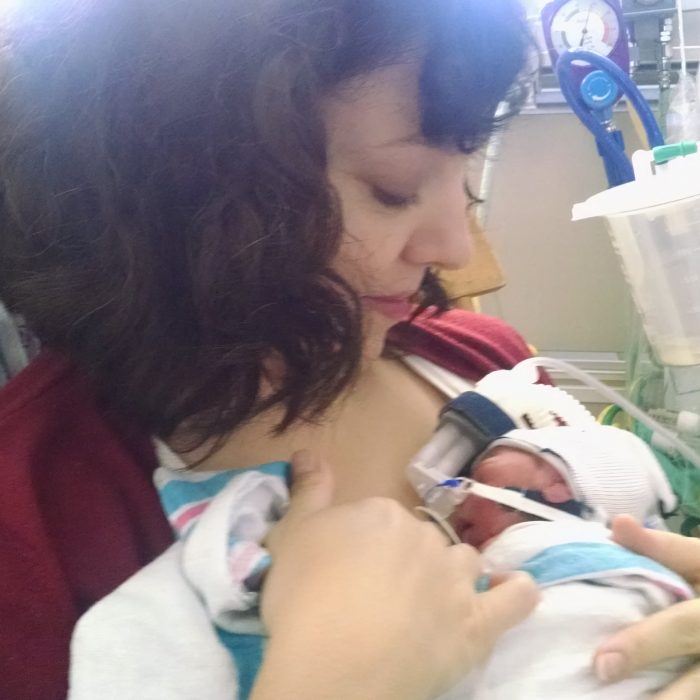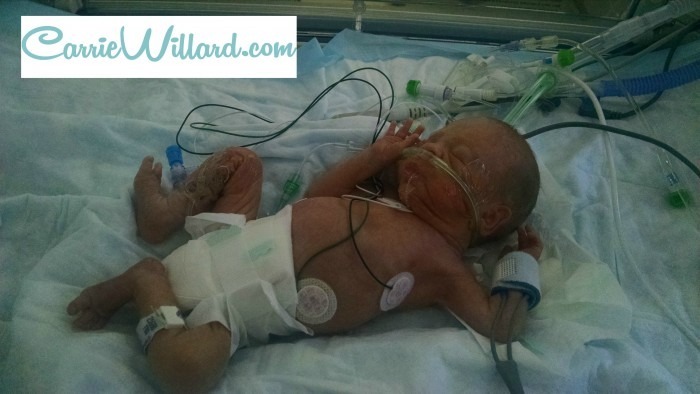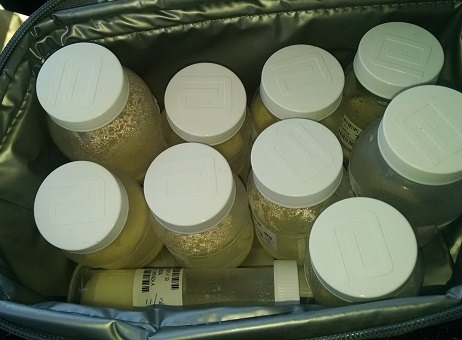This is the start a series on breastfeeding a preemie in NICU. If this is your first time here, here’s the short story. I gave birth to a 27-weeker preemie. Somewhere around 18-21 weeks, my water broke. The little guy survived all that time with little-to-no amniotic fluid. His story is here.
Breastfeeding a preemie in NICU is an important topic. Why? Because nursing a preemie has been nothing like nursing a full-term baby. And even experienced moms like me (my preemie was my 7th kid, all of them breastfed), nursing a preemie is tough.

Preemies often come after high-risk, stressful pregnancies. They often enter the world after an emergency C-section. C-section births are associated with poor breastfeeding outcomes for a reason: hospital procedures such as the use of IV fluids (which cause edema, which cause breastfeeding difficulties), epidural anesthesia, stress and shock to the body of a major surgery with accompanying blood loss – all of these negatively impact breastfeeding outcomes.
Also, there is the emotional anguish, months of worry and fear, and the effect on one’s metabolism of bed rest. All this affects a woman’s confidence.
These many issues create a perfect storm that work against breastfeeding.
And yet.
Breastfeeding a preemie in NICU: why is it so important?
For every benefit that breastfeeding offers a full-term baby, that benefit is increased for preemies. It can literally be a matter of life and death. Necrotizing Enterocolitis (NEC), is a leading cause of death for premature babies. The most important thing that can help prevent it?
You guessed it, breastfeeding.
In addition, breastfed preemies, although they often have slower weight gain at first, have better outcomes than their formula fed peers. They have less infection. Reduced risk of sepsis, meningitis, and respiratory infections such as pneumonia and bronchiolitis – all big killers of premature babies.
Breastfeeding provides huge benefit for a baby who missed out on weeks or months of life in utero, when he would have been getting the benefits of mom’s antibodies.
Breastfed preemies experience long-term cognitive benefits (even at age 7-8). One study showed that formula-fed preemies scored lower on neurodevelopment assessments at 2 and 5 years of age.
You can understand why hospitals strongly encourage mothers to breastfeed their preemies.
Of course, most very premature infants cannot suckle. Once he was able to tolerate small amounts of my milk, my son was tube fed for several weeks until he learned to coordinate sucking, swallowing and breathing.
Then it took him a couple more weeks to learn how to latch onto the breast. And it’s only these last two days, at 6 weeks adjusted age, that he has been able to nurse without a nipple shield (hallelujah!).
Needless to say, all the difficult emotions this ordeal creates aren’t exactly conducive to breastfeeding.
When my other babies were born, I felt confident, safe, content. Like a tiger, bringing babies into the world without pain medications, in the comfort of my own home.
With this baby, the predominant feeling I experienced was TERROR. Grief and worry leftover from the pregnancy, trauma from the delivery, and now that my preemie was in NICU, I felt pure terror.
During my pregnancy I feared every moment that my baby would die, and now that he was born, this fear only increased. I was terrified of getting attached.
In a nutshell, it wasn’t a good scene.
And on top of that, to have to learn this new skill that requires relaxing and trusting my body? Yeeeeah. It’s rather like having a mugger hold a knife to your back demanding you to have an orgasm, NOW. (Sorry if the illustration offends, but it seems perfect.) Let’s just say that ain’t exactly natural.
I thought of myself as a breastfeeding rockstar.
With a total 24 years of breastfeeding under my belt (which, if you’re good at math and know that my oldest child is not quite 17, means I was sometimes nursing through a pregnancy and tandem nursing), several years volunteering as a La Leche League leader, and author of a website and book on breastfeeding, I learned the hard truth.
Namely…
that pumping is a whole different skill that bears little resemblance, maybe none, to the act of suckling a real, live, warm, cuddly, smells like heaven infant.
After my son was born, I immediately requested a breast pump from the hospital. Several hours (and several more urgent requests) later, a Medela Symphony, hospital-grade, electric double breast pump arrived at my bedside. I was still in tremendous pain and was suffering from horrible anxiety, fear and shock.
Is This Thing On? Why You Can Pump For Hours And Get Two Drops Of Colostrum
At this point I had not even touched my baby, and had only seen him for a second before he was whisked away by a team of people to the NICU. No way could I have picked him out of a lineup.
I had breastfed 6 babies exclusively with no major problems, but had almost NO experience with a breastpump. I didn’t know then that it’s extremely difficult to extract colostrum, which has the consistency of GLUE, with a pump.
Breastfeeding a preemie in NICU, part two: pumping for your preemie
Sources (or, I’m not making this stuff about breastfeeding a preemie in NICU up…)
Callen, Jennifer RNC, MSc and Pinelli, Janet RNC, MScN, DNS. “A Review of the Literature Examining the Benefits and Challenges, Incidence, and Duration, and Barriers to Breastfeeding in Preterm Infants.” Advances in Neonatal Care April 2005; 5, 72-88.
La Leche League International. “FAQ: Is Breastfeeding Important for my Premature Baby?” Accessed Sept. 10, 2009 from [link url-https://www.llli.org/FAQ/premimportant.html] https://www.llli.org/FAQ/premimportant.html
March of Dimes. “Quick Reference Fact Sheets: Breastfeeding” Accessed Sept. 10, 2009 from https://www.marchofdimes.com/professionals/14332_9148.asp
Roze, J. C., D. Darmaun, C. Y. Boquien, C. Flamant, J. C. Picaud, C. Savagner, O. Claris, A. Lapillonne, D. Mitanchez, B. Branger, U. Simeoni, M. Kaminski and P. Y. Ancel (2012). “The apparent breastfeeding paradox in very preterm infants: relationship between breast feeding, early weight gain and neurodevelopment based on results from two cohorts, EPIPAGE and LIFT.” BMJ Open 2(2): e000834.
Henderson, G., T. Fahey and W. McGuire (2007). “Nutrient-enriched formula milk versus human breast milk for preterm infants following hospital discharge.” Cochrane Database Syst Rev(4): CD004862.


Leave a Reply